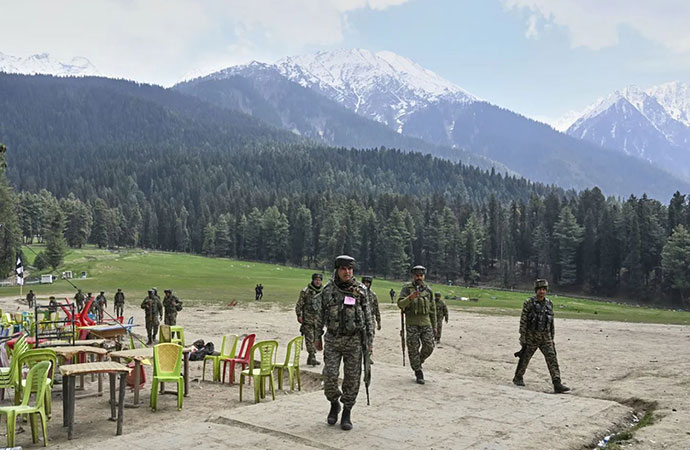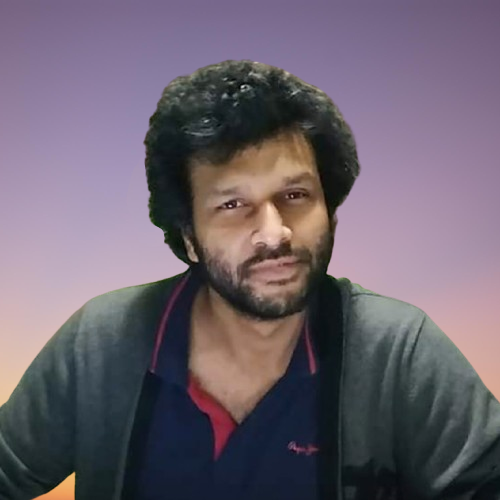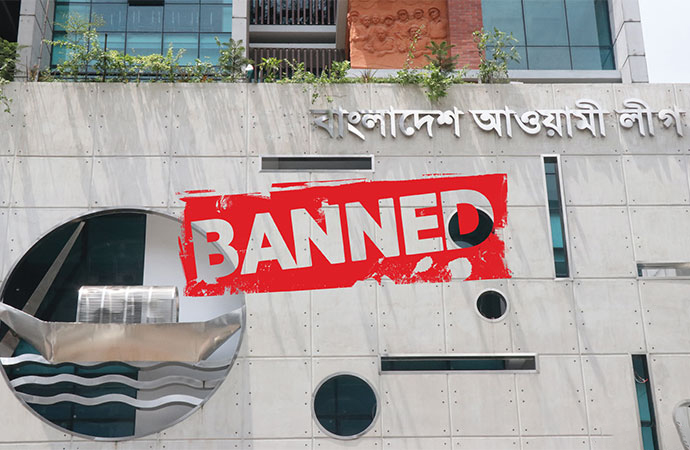Reportage

Indian security officers inspect the site a day after where militants indiscriminately opened fire at tourists in Pahalgam, Indian controlled Kashmir, Wednesday, April 23,2025. Photo: AP/UNB
Having drawn back from the brink of all-out war, India and Pakistan have been exchanging conflicting versions of what exactly brought about the ceasefire mediated by the United States, that was first announced by President Donald Trump on Saturday evening (in South Asia, morning in the US, May 10).
The announcement came as a surprise, since there was no prior word that the US was even involved in any kind of mediation effort. Trump had repeatedly indicated it was too complicated for him, characterising it as a conflict stretching back millenia, while his vice president J.D. Vance, who was in India on April 22 when the terrorist attack at Pahalgam in Kashmir killing 26 people took place, had even said it was "fundamentally none of our business". As recently as last Thursday.
Less than 24 hours later, it was Vance who ended up calling his friend Narendra Modi, the Indian prime minister, after the US reportedly received some "alarming intelligence" on Friday morning (US time, evening in South Asia), CNN reported on Sunday.
Trump administration officials that CNN spoke to declined to describe the nature of the information, citing its sensitivity, but said it was critical in persuading US officials monitoring the situation that Washington should increase its involvement.
Vance first briefed Trump, then spoke with Modi at noon US Eastern time on Friday (close to 10pm in India), making clear to the Indian prime minister that the White House believed there was a "high probability for dramatic escalation" if the conflict went into the weekend.
Vance encouraged Modi to resume direct communications with Pakistan, and to consider options for de-escalation, the officials told CNN. Vance also outlined to Modi a potential off-ramp that the US understood the Pakistanis would be amenable to.
Then began the work of communicating with their counterparts in India and Pakistan, that Secretary of State Marco Rubio was particularly involved in, and this would last through the night, the sources said, till Trump's announcement at 7.55am US ET on Saturday (5.25pm in India).
Trump announced the "full and immediate ceasefire" on social media, and minutes later Rubio posted, "I am pleased to announce the Governments of India and Pakistan have agreed to an immediate ceasefire and to start talks on a broad set of issues at a neutral site."
The timing certainly was strange: Pakistan was just getting started, while India was in a position to press home its first-mover advantage. The fighting had been fierce throughout Saturday, and a ceasefire was seemingly the last thing on anybody's mind at that point. Then came the Trump post on Truth Social.
The ceasefire announcement drove Brahma Chellaney, the hardline strategic affairs analyst, to lament how India had "snatched defeat from the jaws of victory".
If the timeline is correct, it means Pakistan launched Operation Bunyan al Marsoos, its tit-for-tat response to India's Operation Sindoor, even as the US mediation was going on, in the early hours of Saturday.
The new narrative emerging from the CNN report however, undermines much of the jingoistic reporting we have witnessed from both sides. As part of this blitz of conflicting information, the Indian media has been rife with suggestions that Pakistan "begged for a ceasefire" after India hit some of its airbases as the day progressed on Saturday itself, in retaliation for the missile and drone strikes on multiple Indian military targets by Pakistan as Op. Bunyan al Marsoos commenced.
Pakistan on the other hand, has latched on to India's de-escalatory rhetoric following the start of Operation Sindoor (on the night of May 6-7), to claim that India had been asking for a ceasefire from the start.
"If you look at public statements from India's Ministry of Defence and armed forces, they were clearly calling for de-escalation," Lt Gen Ahmed Sharif Chaudhry, the director general of Pakistan's Inter-Services Public Relations (ISPR), said at a press conference Sunday.
"Put it on record that Pakistan never requested for a ceasefire," he added.
The reporting from CNN though, suggests neither side's claims hold much water. The ceasefire may rather have been imposed on them by the Trump administration, after it got majorly spooked by which way things were headed.
What did Washington know?
Naturally this has drawn attention now to what exactly was the 'alarming intelligence' Washington received, that forced it to change its stance and play such a pre-eminent role in defusing the tensions.
CNN itself has studiously refrained from any speculation as to what it might have been.
However, British newspaper The Guardian reported on Monday that according to their sources, the Trump administration officials' attitudes shifted after concerns were raised by US intelligence that the conflict posed a risk "of escalating into a full nuclear threat".
Given the way Vance was tasked with calling Modi first, it can be held that the intel was coming from the Pakistan side, or at least concerned Pakistan. Modi was the one who needed to be filled in.
Most of the speculation tends to concern Pakistan's nuclear arsenal - according to one narrative doing the rounds on Indian media, while striking the Nur Khan Airbase near Islamabad, India's Brahmos missile system had unwittingly come close to striking Pakistan's nuclear establishments, including storage facilities - risking untold damage that could have spilled over to India itself, since the result would have been a nuclear meltdown.
This is completely unsupported by any kind of official statement by either of the two armies or governments. There is also no previous reporting that suggests Pakistan's nuclear facilities are located close to the Indian border.
Intriguingly, Pakistan has also, since 2011, developed a series of so-called tactical nuclear weapons - short-range nuclear weapons designed for more contained strikes, that are meant to be used on the battlefield against an opposing army without causing widespread destruction.
Another line of speculation suggests the intelligence the US received was that Pakistan was getting ready to use its Hatf-IX (Nasr) short range battlefield 'nuclear' missile, as early as next week.
Famously, or rather infamously, Pakistan does not have a No First Use policy, when it comes to its nuclear arsenal (as does India). Even if it did, whether its tactical nuclear weapons would be covered by it is itself uncertain. Pakistan has said it considers India's move to put the Indus Waters Treaty in abeyance as an 'act of war'.
Preparations to deploy the Nasr would make sense as something that Modi needed to know, provided the US was in possession of that information. It is the urgency of the US response, along with what the sources told The Guardian, that makes this a strong possibility - not that Pakistan would have used it, but rather that the US received some strong intelligence along those lines. The veracity or reliability of the intel could itself be questioned of course.
While Islamabad praised the overt US involvement, New Delhi downplayed it - for over fifty years, India has sought to avoid the 'internationalisation' of its issues with Pakistan, particularly over Kashmir, which is the essence of the 1972 Simla Agreement, signed in the aftermath of the Bangladesh War of Liberation, in which India had achieved a decisive victory. It said that all issues between the two countries would be worked out bilaterally. As the stronger power, this works to India's advantage of course.
In a little-noticed response to India's move centring the IWT, Pakistan had announced that it was suspending the Simla Agreement - meaning it would no longer resist third party intervention in the issues affecting the two nations' relations, and may even seek to invite it.
Ultimately, that may be the principal source of the discontent in India with the ceasefire. The fact that it was effectively announced 'from Washington' was immediately seized upon by the opposition Congress party.
"America announced the ceasefire, and the American side also said things like 'discussions to be held at a neutral place'. It's a worrying subject. Internationalisation of Kashmir is not acceptable to us," said senior Congress leader Sachin Pilot, the party's national general secretary.
The immediate task for the Modi government therefore, would most likely be how to untangle itself from any such commitment. But if the US becomes assertive over its role, with Trump having smelt the kind of success he has been looking for in Gaza and Ukraine, this may prove more complicated than it looks at the moment.
Shayan S Khan is Executive Editor of the Dhaka Courier and United News of Bangladesh (UNB)

























Leave a Comment
Recent Posts
Right On Schedule
The most eagerly anticipated, and frankly hyped up, announcement of an ...
Fighting raged along the borde ...
Fighting raged along the border of Cambodia and Thailand, with explosi ...
ICIMOD drives regional cooperation to inspire new mo ..
The Cage of Captivity and the Cry for Freedom: A Cru ..
Why Japan issued an advisory for a possible megaquak ..
The Autocrats’ War on Universities